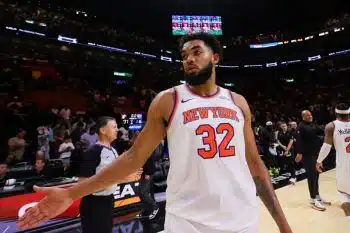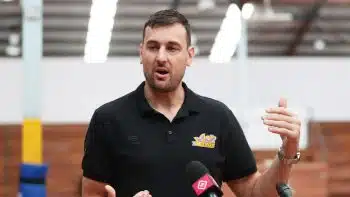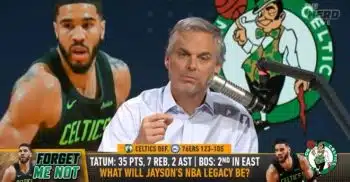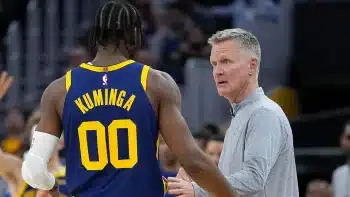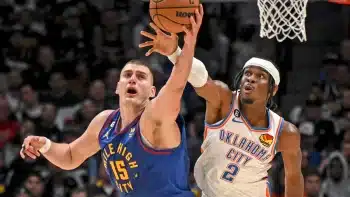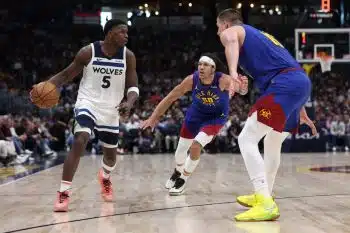NBA
New York Knicks Remain Stuck in Neutral
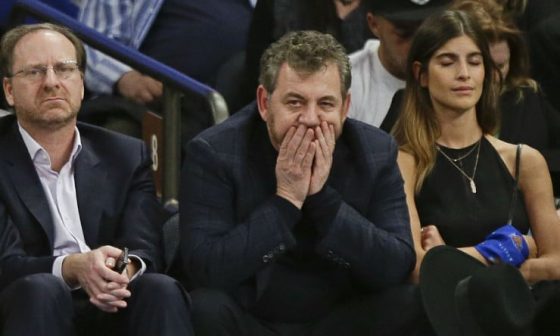
It was all good just a week ago…
As recently as the middle of last week, the New York Knickerbockers were drawing praise from basketball pundits across the land. It appeared the Knicks were on the right track and there were legitimate reasons for New Yorkers to be optimistic.
After having parted ways with Phil Jackson, New York appeared to be closing in on hiring an accomplished general manager in David Griffin. One of the primary reasons why an experienced executive such as Griffin would be interested in the job was because the Knicks had plenty of cap space to work with this summer, and potentially even more in the near future.
Other than the crippling Joakim Noah contract, Courtney Lee was the only other player on the entire roster with a guaranteed contract that extended past the 2018-19 season.
The logical decision for New York going forward was to focus on the future and dedicate themselves to a complete and thorough rebuild. The most important piece was already in place: Kristaps Porzingis, the franchise cornerstone, around which the rest of the roster will be constructed. The Knicks also have Willy Hernangomez locked into an incredibly team-friendly contract and recently drafted Frank Ntilikina, whom the organization hopes will form a terrific partnership with KP.
One crucial step in a disciplined, successful rebuild is maintaining cap space. Even if they did have the room to add a max player this summer, the reality is the Knicks are so far away from being a threat to the top teams in their division, let alone a contender for the championship, that one player wasn’t going to make a significant difference. As a result, the smart play during this free agency period was to stay on the sidelines and patiently wait until value presented itself.
Last summer, NBA GM’s sprinted out of the gates at the start of free agency, offering massive contracts to flawed players. The salary cap was spiking, and impatient teams were looking to make an immediate splash. The Lakers agreed to pay Timofey Mozgov $64 million over four years within hours of the start of free agency. L.A. later inked Luol Deng to a contract worth $72 million. The Grizzlies gave Chandler Parsons $95 million. The Knicks handed $72 million to Joakim Noah.
After that initial splurging, the teams that waited were able to secure some solid values. Miami inked Dion Waiters to a two-year, $6 million pact. The Mavericks stole Seth Curry, signing him for two years at less than $6 million. The Spurs got Dewayne Dedmon to sign for similar terms.
This year, front office folks seemed to have learned their lesson (seeing the Lakers being forced to trade away D’Angelo Russell just to dump the contract of the aforementioned Mozgov on the eve of this year’s free agency frenzy, may have scared them straight). There were very few shocking contracts agreed to in the first few days of free agency. Even All-Stars such as Kyle Lowry and Paul Millsap got far less than the max. In addition, far fewer teams were willing to lock up players long term, instead offering a plethora of one and two-year deals.
It seemed the Knicks were prudently protecting their cap space as well. Not only was it in the best interest of their rebuilding efforts to keep their hands in their pockets, but they also did not yet have a general manager in place. Steve Mills was calling the shots in the interim, but the Knicks appeared to be content to stand pat, unwilling to make any franchise-altering decisions until they hired their new GM.
And then, it happened. Late Thursday night, word broke that the Knicks had signed restricted free-agent Tim Hardaway Jr. to a four-year, $71 million offer sheet.
The Hawks had until midnight on Saturday to match it, but it was fairly obvious early on they would never even seriously consider agreeing to pony up that type of money for Hardaway Jr. Multiple NBA insiders reported that the Hawks were willing to pay up to approximately $45 million. The Knicks ended up paying $25 million more than the Hawks were comfortable with.
On top of that, Mills inexplicably felt the need to include a player option for the fourth year and a 15-percent trade kicker. The trade kicker makes the contract incredibly difficult to move. Given the drama surrounding the Carmelo Anthony situation, the Knicks, of all franchises, should be painfully familiar with the complications that can result from such seemingly innocuous details in a deal.
The Hawks formally announced they would not match on Saturday.
Then, on Sunday, word leaked that David Griffin had withdrawn his name from consideration for the GM job in New York.
And, here we are.
It is important to note that Tim Hardaway Jr. is a quality player. He’s only 25 and is coming off the best few months of his NBA career. Hardaway averaged 17.5 points per game over the second half of the 2016-17 campaign. He’s a capable outside shooter, which is something the Knicks certainly need. He was a subpar defender early in his career, but showed significant improvement over his two years in Atlanta. Under the right circumstances, such as the Knicks inking him at closer to $8 or $9 million per season over three years, it would have been an understandable signing.
However, the contract the Knicks offered has a disastrous downside.
First, it is a significant risk to assume Hardaway Jr. will match, let alone exceed, the production he posted late in the 2016-17 season. Prior to this past January, Hardaway Jr. had never averaged more than 13 points per game in any month of his entire four-year career. There is a rather large sample size that suggests that his flaws will prevent him from becoming an above-average shooting guard. And, for the amount of cap space the Knicks invested into him, that’s exactly what they’ll need to see.
For players that absorb nearly 20 percent of a team’s cap space, it’s imperative that they become solid starters, if not stars.
Still, if the Knicks were just one piece away from becoming a true contender, and Hardaway Jr. was the final ingredient that they thought would put them over the top, then maybe it would understandable to wildly overpay for his services. That is clearly not the case.
Worse yet, even if Hardaway Jr. exceeds expectations and things break right for New York, that “best case scenario” likely means the Knicks will win around 35-37 games.
There’s a reason New York has been unable to escape the muck of mediocrity and the Atlantic division basement for the better part of two decades (the Knicks have lost 768 games this century, more than every team in the league except the Timberwolves). It’s because the Knicks refuse to commit to a full-fledged rebuild. Starting way back with the dreadful decision to trade Patrick Ewing at the end of his career, they have never taken the steps necessary to embark on what is an admittedly arduous process.
The Knicks current objective should NOT be winning 37 games next season. The goal should be methodically building a balanced roster that is capable of consistently winning 50-plus games a few years down the road.
In addition, one common theme in the Knicks’ lack of success has been their inability to defend. The Knicks have finished the regular season ranked in the top-half of the league in Defensive Efficiency just once over the last 17 years. Coincidentally, that also happened to be the sole season this century they finished with more than 50 regular season wins and advanced past the first round of the playoffs.
At the end of each disappointing campaign, as free agency approaches, Knicks coaches and front office personnel usually proclaim that their defensive performance the prior year was unacceptable and that they’ll focus on improving that end of the floor going forward. Yet, time and again, the Knicks chase offensive-minded players when they open up their checkbooks. Tim Hardaway Jr. is another such example. Besides the fact that they grossly overpaid for Hardaway Jr.; that that they still don’t have a veteran point guard to mentor Ntlikina and feed the ball to KP and Willy; that they already have a solid starting shooting guard in Courtney Lee locked into an affordable long-term contract; Tim Hardaway Jr. will not improve the team defensively.
And one last point on Hardaway Jr.: If THJ does develop into the stud that Mills obviously believes he will, Hardaway Jr. has a player option for that fourth and final season, which means he can opt out and become an unrestricted free agent in the heart of his prime.
Lots of Knicks fans seem agitated and perplexed as to why so many in the media are ripping the Hardaway Jr. signing. Via Twitter replies, frustrated fans ask incredulously: “Maybe they slightly overpaid, but the Knicks just added a young, athletic player who can score in bunches. How can that possibly be a bad thing?!?”
It seems counterintuitive to fans and casual observers of the NBA, but sometimes when a team signs a good player, it actually results in that team being further away from title contention. Adding a good player on a bad contract can be debilitating.
Landing solid/mediocre players on good/great contracts are how smart teams flesh out their roster.
Due to the constrictions of the salary cap, every single dollar counts. Overpaying by a few million can be crippling. Overpaying by upwards of $20 million can be catastrophic.
For instance, just last week the Celtics were forced to trade away Avery Bradley, one of the game’s most feared perimeter defenders and a rising two-way star, solely because Boston desperately needed to clear $3 million dollars off their books to sign Gordon Hayward.
This past weekend, the Nets traded journeyman Justin Hamilton in exchange for DeMarre Carroll, a 2018 first-round pick and a 2018 second-round pick. This was an illustrative example of how preserving cap space can net a shrewd franchise future assets.
The Knicks’ cap space both now and in the future has been greatly diminished. As a result, New York has far less flexibility. Having financial freedom both this summer and in the years ahead is simply far more valuable than adding an athletic scorer to a terribly imbalanced roster.
Unsurprisingly, we have recently seen other teams secure cap-friendly deals. The Suns just signed promising big man Alan Williams to a three-year, $17 million salary. The Knicks had expressed interest in adding Williams, but didn’t have the cap space to make a competitive offer. (Hardaway’s average annual salary will be greater than the $17 million total Williams will make through 2020). Justin Holiday, who played well on both ends of the floor for the Knicks last season, signed for $9 million over two years. Tyreke Evans will make just $3.2 million next season.
These are the types of low-risk, high-reward contracts the Knicks should have been handing out.
At the very least, New York should have made every effort to hire a permanent GM, allowing him to sign-off on all important decisions. Which brings us back to the loss of David Griffin as a front office candidate. Apparently, Griffin wanted to bring with him a trusted cadre of scouts and executives and to have the final say in basketball-related decisions. The Knicks and owner Jim Dolan inexplicably balked at this reasonable request. Despite the putrid record of the team during the tenure of the front office personnel currently in place at Madison Square Garden, Dolan and the Knicks refused to grant autonomy to a GM with three straight Finals appearances and a championship on his resume.
Knicks fans that have watched this organization operate shouldn’t be surprised. Unfortunately, it’s the continuation of a vicious cycle.
Two common denominators during the decade-plus the Knicks have spent in the doldrums has been too much Jim Dolan and not enough defense.
Less than a week ago, it appeared the Knicks were on their way towards escaping the pitfalls of the past and inching their way towards respectability by committing to patiently building a team the right way.
Yet, just a few days later, here we are…
